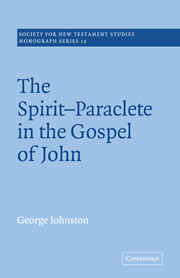Book contents
- Frontmatter
- Contents
- Preface
- Abbreviations
- PART I ‘SPIRIT’ IN THE FOURTH GOSPEL: A GENERAL SURVEY
- 1 The Meanings of ‘Spirit’
- 2 Spirit of God, Spirit of Christ
- 3 The Spirit–Paraclete
- 4 The Spirit in the Church of Disciples
- 5 ‘Spirit’ as Power for a Messianic Ministry
- PART II THE SPIRIT–PARACLETE, THE SPIRIT OF TRUTH
- Appendix 1 The Literary Structure of John
- Appendix 2 Literary Analysis of John 13–17
- Select Bibliography
- Index of Passages cited
- Index of Authors
- Index of Subjects
5 - ‘Spirit’ as Power for a Messianic Ministry
Published online by Cambridge University Press: 26 February 2010
- Frontmatter
- Contents
- Preface
- Abbreviations
- PART I ‘SPIRIT’ IN THE FOURTH GOSPEL: A GENERAL SURVEY
- 1 The Meanings of ‘Spirit’
- 2 Spirit of God, Spirit of Christ
- 3 The Spirit–Paraclete
- 4 The Spirit in the Church of Disciples
- 5 ‘Spirit’ as Power for a Messianic Ministry
- PART II THE SPIRIT–PARACLETE, THE SPIRIT OF TRUTH
- Appendix 1 The Literary Structure of John
- Appendix 2 Literary Analysis of John 13–17
- Select Bibliography
- Index of Passages cited
- Index of Authors
- Index of Subjects
Summary
In an earlier chapter it was said that John relates spirit to Jesus as the Christ of God, whose mission was to bring the knowledge of God, and for believers in this truth ‘life abundant’ even in a dark and dangerous world (10: 10; 17: 2f.). This has such significance for the subject of this volume that it requires fuller elaboration now.
Three trends in the Messianic Hope of intertestamental times assume unusual interest in the light of John 1: 19–28.
It is shown there that the Baptist disavowed each of three roles, the Messiah's, Elijah's, and the Prophet's. We have to deduce from this curious combination of two titles with one personal name that Elijah conceals a title and a function. From all that is presently known about the period concerned we can say that this was the rôle of a Messianic priest, probably the High Priest of the new age. Personal names for the other functions are easy to find: the Messiah or Christ is almost certainly an equivalent here for ‘King’ and the King is David (2 Sam. 7: 16; Pss. of Sol. 17; Luke 1: 69; cf. Rom. 1: 3, etc.).
The Prophet is Moses, on the basis of Deut. 18: 15–19; 4Q Testimonia; 11Q, Melchizedek?; John 6: 14; Acts 3: 22 f.
Now, when we examine the Synoptic accounts (Matt. 4: I – II ∥ Luke 4: 1–13) of Jesus' desert temptations, the three elements found in John's narrative can also be discovered:
(a) The Davidic or royal function is referred to in the offer of the authority and glory of all the kingdoms of the world (Luke 4:5 f.).
[…]
- Type
- Chapter
- Information
- The Spirit-Paraclete in the Gospel of John , pp. 52 - 58Publisher: Cambridge University PressPrint publication year: 1970



